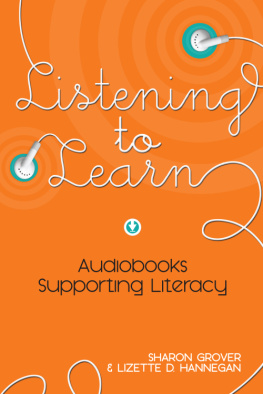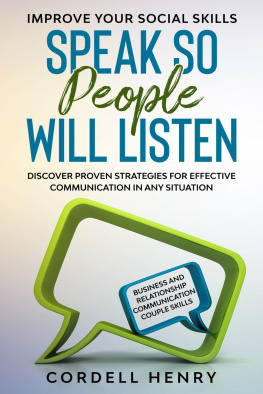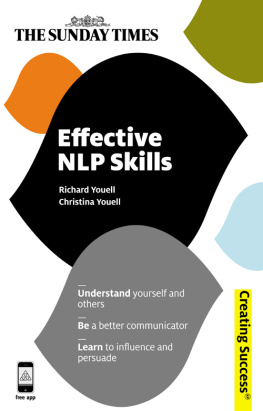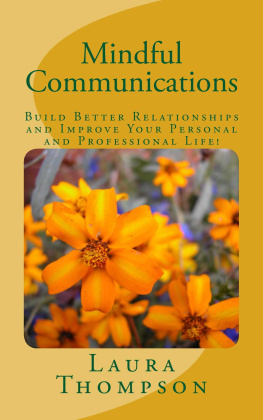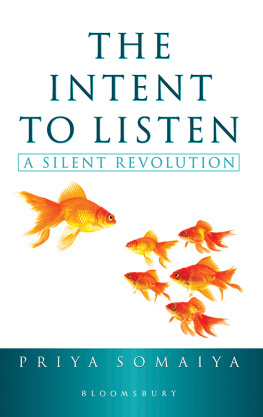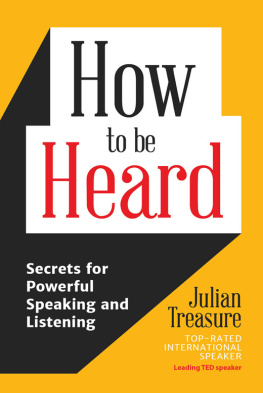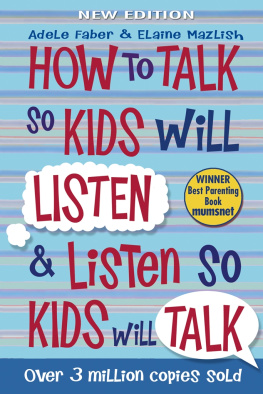Thank you for downloading this AMACOM eBook.
Sign up for our newsletter, AMACOM BookAlert , and
receive special offers, access to free samples, and
info on the latest new releases from AMACOM,
the book publishing division of
American Management Association.
To sign up, visit our website: www.amacombooks.org
To learn more about the American Management
Association visit: www.amanet.org

The copyright information for this title may be found at the end of this eBook file.
LISTEN UP
OR LOSE OUT
ALSO BY ROBERT BOLTON AND DOROTHY GROVER BOLTON
Social Style/ Management Style:
Developing Productive Work Relationships
People Styles at Work:
Making Bad Relationships Good
and Good Relationships Better
What Great Trainers Do:
The Ultimate Guide to Delivering
Engaging and Effective Training
BY ROBERT BOLTON
People Skills: How to Assert Yourself,
Listen to Others and Resolve Conflicts
Robert Bolton and
Dorothy Grover Bolton

LISTEN UP
OR LOSE OUT

How to Avoid Miscommunication,
Improve Relationships, and
Get More Done Faster

To Our Children
William Gabor
Robert Gabor
Hallie Hawkins
James Bolton
Betsy Bolton
Douglas Bolton
Kristin Bolton
A good listener is not only popular everywhere, but after a while he knows something.
WILSON MIZNER
CONTENTS
by Robert and Dorothy Grover Bolton
INTRODUCTION
What This Book Will Do for You

Listening is not only the skill that lets you into the other persons world; it is also the single most powerful move you can make to keep the conversation constructive.
DOUGLAS STONE, BRUCE PATTON, AND SHEILA HEEN

LIKE MOST PEOPLE at work and in their personal lives, you probably spend many hours a day conversing with others informally or in meetings, face-to-face interactions, telephone calls, and so forth. These conversations can either strengthen or weaken work and other interpersonal relationships, including ties to friends and loved ones. As consultant Susan Scott notes, [O]ur work, our relationships, our very lives succeed or fail... one conversation at a time.
When people converse, they generally underestimate the importance of listening. They tend to be more concerned about talking than about how well they listen. As they anticipate significant conversations, they worry about what theyre going to say, not whether theyll get what the other person is communicating.
Unquestionably, the ability to speak effectively is a key asset. But the undramatic skill of listening is no less important.
Listening lies at the heart of just about everything we do with people. The average person spends about 50 percent more time listening than speaking., the typical listener actually misses more of a message than she takes in.
When listening is ineffective, meaningful conversation is unlikely. And poor listening can be costly. Its frustrating to think of the information that went in one ear and out the other, the opportunities that were lost, and the relationships that were strained or broken because we missed the message.
Research-Based listening skills
Fortunately, social scientists have discovered methods that greatly improve listening, as well as the kinds of behaviors that militate against it. Rather than spinning ivory tower theories, they observed peoples conversations to learn which listening behaviors are effective and which ones are detrimental. Initially, they studied interactions between therapists and patients. Soon they turned the research spotlight on conversations between teachers and students, husbands and wives, parents and children. Some investigators found ways to observe how people listen in the course of business meetings, sales transactions, and the like. Newly invented recording devices secured an accurate account of every word in a conversation.
Heres how psychologist Carl Rogers, one of the preeminent pioneers in researching listening, described some of those moments:
I cannot exaggerate the excitement of our learnings as we clustered about the machine that enabled us to listen to ourselves, playing over and over some puzzling point at which the interview clearly went wrong, or those moments in which the client moved significantly forward.... We discovered that we could pinpoint which response of the therapist caused a fruitful flow of significant expression to become superficial and unprofitable. Likewise we were able to spot the remark that turned a clients dull and desultory talk into a focused exploration.
Researchers repeatedly listened to their recordings. They pored over transcripts of the interactions. When motion picture and video technology became available, the investigators were able to document changes in a speakers posture, gestures, facial expression, and eye contact in response to the way their conversational partner was listening. Some of the analyses were incredibly thoroughone description of a five-minute transaction filled an entire book.
These kinds of painstaking research revealed ways of listening that encourage speakers to open up and talk frankly. Behavioral scientists found that those same ways of tuning in to others enhanced the listeners ability to understand and retain what was said. Furthermore, good listening was found to improve the speakers fluency. Thus, good listening often initiates a virtuous cycle of greatly enhanced communication. Equally important, these improved ways of listening increase rapport between the listener and the speaker. We refer to this research-based listening as skilled listening.
The researchers also identified a set of widely used dysfunctional listening habits that are likely to trigger defensiveness in the speaker, who then tends to become more guarded and to withhold useful information. (In this book, quotation marks around the word, listener or listening indicates that the person is using nonlistening behavior when it would be appropriate for her to be listening.) These listening missteps not only inhibit frank communication; they also chip away at the listeners relationships.
Listening had never been studied so thoroughly or so scientifically. The most significant outcome of this research was an integrated set of best listening practices that youll learn as you read this book. Although the discoveries are several decades old, theyve not been disseminated widely. And in the ensuing years, enhancements in skilled listening have made it even more effective. So, for most readers, the methods taught in this book will provide a new and much more effective way of listening. I think youll be amazed at how this better way of listening will contribute to virtually every facet of your life. These skills will enable you to capitalize on opportunities that a poor listener would likely miss. They will reduce communication glitches, diminish the likelihood that the speaker will become defensive, get problems into the open, calm tense situations, and ultimately improve your relationships as you listen better to colleagues, customers, family, friends, and others.
Next page

